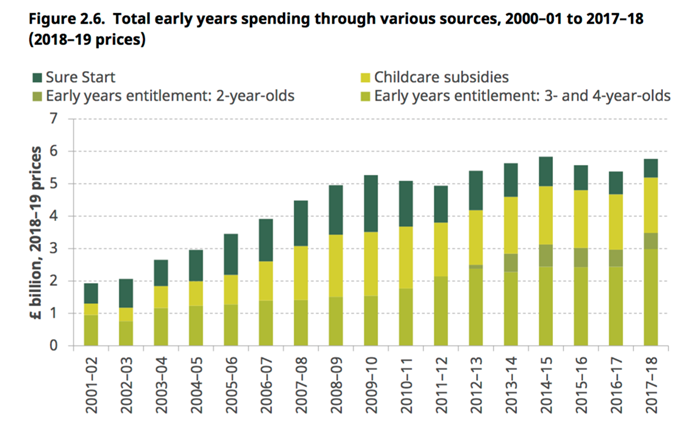Government early years spending rises for first time in three years
Neil Puffett and Joe Lepper
Tuesday, September 18, 2018
The total amount spent by government on early years services rose for the first time in three years in 2017/18, but is still down on 2014/15 levels a report has found.

A study by the Institute for Fiscal Studies shows that the government's combined spending on early years provision rose to £5.77bn in 2017/18.
It represents the first spending rise since 2014/15 when spending rose to a record £5.84bn, but fell in subsequent years to £5.57bn in 2015/16 and £5.38bn in 2016/17.
The study said the rise in spending witnessed in 2017/18 is largely down to the extension of funded childcare for three- and four-year-olds from 15 hours a week to 30 hours a week which was introduced in September 2017.
Spending on early years entitlements for three- and four-year-olds rose from £2.44bn in 2016/17 to £2.98bn in 2017/18.
Conversely, the amount spent on early years entitlements for two-year-olds has dropped steadily from £690m in 2014/15 to £505m in 2017/18.
Meanwhile, funding levels for childcare subsidies have remained relatively constant at around £1.7bn a year since 2012/13.

But the figures show that spending on Sure Start children's centres has dropped significantly in recent years. In 2009/10 Sure Start spending was £1.76bn but by 2017/18 it had fallen to £576m.
The report suggests early years funding faces two main challenges over the coming years.
Firstly, it raises concerns over funding levels for providers to offer the 30-hour entitlement for working parents.
"Successful implementation of the new 30 hours extended entitlement will require providers to be willing to offer it, given the funding available," states the report.
"To date, many have, but there is significant geographical variation in take-up rates. The government should therefore continue to monitor overall levels and variation in take-up of the new extended entitlement."
Earlier this month, the National Day Nurseries Association said there had been a sharp increase in nursery closures since the introduction of the 30 hours childcare scheme.
Secondly, the report raises concerns over the early years national funding formula and how it can effectively promote high-quality provision.
"Whilst the new funding system is welcome in ensuring transparency and consistency in funding allocations, it is currently difficult for the funding formula to incentivise and support high-quality provision as there is no agreed definition of ‘high-quality' provision," the report adds.
The funding formula was introduced in April 2017 and sets the hourly rates councils receive to fund the childcare entitlement for three- and four-year-olds.
The 2018/19 formula showed that 70 per cent of England's 150 councils will see no change in the hourly rate for the 30 hours funded childcare offer to three- and four-year-olds.
A Department for Education spokesman said: "We want every child to have the best start in life which is why we are spending more than any other government on supporting early years education and childcare - around £6bn a year by 2020.
"There are 1.3 million children benefitting from some form of government-funded early education and a recent report showed the benefits of formal childcare on the early social and emotional skills of two- to four-year-olds.
"We believe it is up to local councils to decide how to organise and commission services in their areas. They are best placed to understand local needs and how best to meet them, whether using children's centre buildings, family hubs or delivering services through another model."




